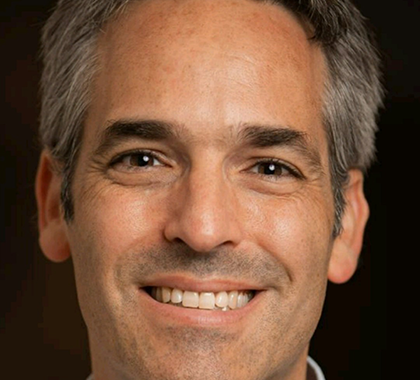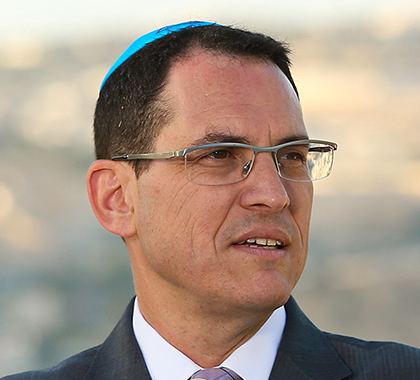For over 50 years Rabbi Brovender has has taught thousands of students from all around the world. This week we introduce you to Rabbi Yehudah Potok, who has worked in a variety of Jewish educational settings such as camps, congregational schools, and day schools, including serving as head of school for the past twelve years. He is currently the Director of the Jewish Education Program at Facing History and Ourselves, where he leads the organizational efforts in Jewish educational settings. Rabbi Potok lives in Silver Spring, MD, with his wife and children.
[caption id="attachment_75209" align="alignright" width="640"] Yeshiva trip to Ukraine. Rabbi Brovender (left) and Rabbi Potok (right)[/caption]
The WebYeshiva Blog
For over 50 years Rabbi Brovender has taught thousands of students from all around the world. During his long career he had the privilege of working alongside many distinguished colleagues. This week we introduce you to Rabbi Menachem Schrader, who taught Gemara at Yeshivat Hamivtar from 1982 - 2008. He lives in Efrat, Israel and is Founding Director of JLIC, the Jewish Learning Initiative on Campus.
[caption id="attachment_74849" align="alignright" width="300"] Rabbi Brovender and Rabbi Schrader at a wedding in 2018[/caption]
When did you first meet Rabbi Brovender?
I first met Rabbi Brovender when he visited Yeshiva University and he spoke with some of us who were studying in the Kollel in the 1970s, well over 40 years ago.What was special about the environment in the yeshiva and working with Rabbi Brovender?
Working with Rabbi Brovender was the primary and longest working experience I have had, lasting for 25 years. I experienced his personality as highly complex, with nuanced and complicated perspectives on almost everything under the sun. The Yeshivat Hamivtar environment was one of intellectual openness within the context of religious observance. Skills were taught in how to study Torah, including Bible and its traditional commentaries, Mishnah and Talmud and their traditional commentaries, Jewish Law, and Jewish philosophical works. As far as the Jewish philosophy implicit and inherent in the Yeshiva, Rabbi Brovender felt the Torah studied would speak for itself. We did not have an agenda as to "the correct hashkafah" the student was to take with him. Different students received from the yeshiva different ideas and even different commitments. Students usually concluded that Judaism would be discovered from a proper effort towards understanding the Torah.Is there a special insight you gained from your time together that you carry with you in life?
Rabbi Brovender's tolerance of different people, personalities, ideas, and approaches undoubtedly affected me in my own approach towards others who I work and deal with. His openness makes possible a broad approach allowing the positive of all the above to co-exist in the four walls of the Beit Medrash. The legitimacy of conflicting views has become a necessary component of my continuing efforts to strengthen Torah Judaism. He represented this more than anyone else I can think of.
For over 50 years Rabbi Brovender has taught thousands of students from all around the world. This week we introduce you to Rabbi Michael Sunshine. After receiving semicha through Yeshivat Hamivtar, Rabbi Sunshine worked at a shul in San Antonio, TX, for four years and then ran the Jewish Student Connection (JSC) in Denver, CO, for 8 years. JSC runs clubs in public high schools helping teens develop and deepen their Jewish identities and their connection with Israel. Rabbi Sunshine currently works at amhsi.org and lives in Ra'anana, Israel with his wife and children.
[caption id="attachment_74712" align="alignright" width="300"] Rabbi Brovender with Rabbi Michael Sunshine[/caption]
How did you meet Rabbi Brovender?
The first time I met Rabbi Brovender was when he came to the University of Pennsylvania campus. I had heard of Rabbi Brovender and his yeshiva years earlier when many of my friends learned at Hamivtar between high school and college. But when Rabbi Brovender visited UPenn I remember he gave a shiur on Birkat Hamazon and the analytical way in which he broke down each bracha and explained it.What do you find most important or striking about the "Brovender Method" - his unique way of teaching?
Rabbi Brovender's methodology, as I see it, comes down to an honest and analytical approach of whatever source you're learning. It means paying attention to the specifics and nuance of language, and working to understand what is actually being said, as opposed to what you think, or want the text to say. I think Rabbi Brovender's method stems from an approach based on humility where you put yourself and your ego to the side, and try to figure out what the Gemara, or the Shulchan Aruch, or the Sfas Emes is actually trying to say to us. When it comes to Torah learning, what were you most drawn to after learning with Rabbi Brovender? From my years as a talmid of Rabbi Brovender, I understood that, for me at least, that to be a well-rounded and committed Jew I would need to learn or to be able and open to learn Torah from all different angles. What lesson or specific Torah that you learned from Rabbi Brovender, do you keep coming back to or carry with you wherever you go? I don’t think of it as a time period of "after learning with Rabbi Brovender." When I left the yeshiva to go work in the States, I remember feeling an acute sadness of not being able to learn every day with the rebbeim in the yeshiva. I had a feeling of shleimut, of wholeness, which at the time I felt I was putting aside. Then, in my first few months in San Antonio when I would prepare shiurim I realized I had actually taken the yeshiva with me. Besides the ideas I learned and knowledge I gained in the yeshiva, I realized that I was taking with me the methodology of learning and ability to open up a sefer, whether a Gemara, a Rashi, or a Rambam, and learn it with the skills I developed in the yeshiva. To go a step deeper, from my time learning with Rabbi Brovender I learned that as a Jew there is a unique position we have in the world and by learning the Torah and doing mitzvot we infuse the world with kedusha – transforming something from the way it is to the way it can be. Bringing out its potential. I often come back to the belief that Rabbi Brovender has instilled in his talmidim the confidence to accomplish great things. At the times when I am uncertain of my abilities, I remember that Rabbi Brovender asked me to teach his shiur for a short period of time when he was overseas. At first I was shocked, and then I understood that if he thought I could do it, then I could. But there is one specific Torah that I think about, especially during the Yamim Noraim. During Elul 5756 (1996), Rabbi Brovender taught a Torah of Rebbe Nachman. Rebbe Nachman explained that during Elul and the Yamim Noraim one can be uplifted to great heights and attain a significant connection with God. While it is impossible for that intense spirituality to be maintained throughout the whole year, one's moments of Dveikut during the year should not be fleeting. Rather, when we leave the intense embrace of God that we find during the Yamim Noraim, we should be changed, like the imprint left on clay by the king's signet ring. When we start the new year, we, in fact, will be different than we were just days before.
For over 50 years Rabbi Brovender has taught thousands of students from all around the world. This week we introduce you to Jeffrey Schrager, a Jewish educator who teaches with several different organizations around the world. He lives in Efrat with his wife and four children.
[caption id="attachment_74008" align="alignright" width="300"] Rabbi Jeffrey Schrager[/caption]
How did you meet Rabbi Brovender?
I first “met” Rabbi Brovender on the phone. I applied for the Yeshiva very late in the year and my acceptance was contingent on an interview. I was nervous and expected a lot of questions, but Rabbi Brovender asked about my background and then said, “I think we have room for you.” My first year at yeshiva he was teaching in London most of the year, so I really wasn’t around him much. Shana Bet, however, I was in his shiur and, in many ways, I’ve never left.
What do you find most important or striking about the "Brovender Method" -his unique way of teaching?
Whenever I heard anyone ask him to define the “Brovender Method,” he would say some version of, “we learn Gemara.” Of course, the emphasis on skills and independent learning were important, but the basic concept of the importance of “just learning” is what changed me.
It seems to me the Brovender Method, in some ways, is about attitude. Learning, and learning Gemara in particular, could be compared to breathing. I learned innumerable skills from Rabbi Brovender, but I also learned that learning and the desire to learn must be a fact of life, not something “extra.”
When it comes to Torah learning, what were you most drawn to after learning with Rabbi Brovender?
I’ve become primarily a teacher of Tanakh, and I spend most of my time learning Tanakh and related subjects. I’ve also dabbled in other subjects, but Gemara still holds a special place in my heart and mind. The thrill of participating in the “symposium of generations,” as Rav Soloveitchik termed it, enchants me.The experience of learning Gemara, for me, is tied strongly to the experience of learning with Rabbi Brovender. Opening a Gemara transports me back to the beit midrash at Yeshivat Hamivtar, and specifically to Rabbi Brovender’s makom.
I’ve been blessed to learn in many different locales, but my identity as a learner is rooted deeply in that setting.
What lesson or specific Torah that you learned from Rabbi Brovender, do you keep coming back to or carry with you wherever you go?
It’s funny: I can think of many ideas I learned with Rabbi Brovender, but what I took away with me more than anything was an attitude towards learning Torah. It is the foundation of a Jewish life.I think my entire approach to learning and teaching results from my time learning with Rabbi Brovender. I want my students to learn because they love it, without shtick or a need for recognition, motivated not by politics or a desire to be proven right. Just a search for truth because it is the Truth.
I always remember learning the beginning of the third perek of Shabbat in Rabbi Brovender’s shiur, but the experience is what I treasure, the back and forth in the Gemara that doesn't even always ultimately come to a clear conclusion.
Outside of my family, Rabbi Brovender has done more than anyone to shape the person and Jew that I am. It wasn’t through any specific moment or epiphany. It was his
dedication to learning Torah and his dedication to my learning Torah that continues to inspire me.
Nov 13, 2021
Rabbi Brovender Legacy Interview: Mitchell Barak
For over 50 years Rabbi Brovender has taught thousands of students from all around the world. This week we introduce you to pollster, strategic communicator, and procreator Mitchell Barak.
Throughout his 30-year career living in Israel, Mitchell has worked at the highest and lowest levels of the Israeli Government. Today, through his KEEVOON: Research Strategy & Communications, he helps clients develop effective, survey research based messaging which they use to communicate with their customers or constituents. He lives in Jerusalem with his wife and eight children.
[caption id="attachment_73779" align="alignleft" width="300"] Mitchell Barak[/caption]





